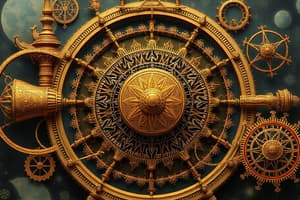Podcast
Questions and Answers
Which law states that an object in motion stays in motion unless acted upon by an unbalanced force?
Which law states that an object in motion stays in motion unless acted upon by an unbalanced force?
- Newton's second law
- Law of universal gravitation
- Newton's first law (correct)
- Newton's third law
What does the equation F = ma represent?
What does the equation F = ma represent?
- The relationship between heat and work
- The conservation of energy
- The behavior of electric charges
- Force equals mass times acceleration (correct)
What is the main focus of thermodynamics?
What is the main focus of thermodynamics?
- The behavior of electric charges
- The interactions between light and matter
- The motion of macroscopic objects
- The relationships between heat, work, and energy (correct)
Which law of thermodynamics states that energy cannot be created or destroyed?
Which law of thermodynamics states that energy cannot be created or destroyed?
What describes the interaction between electric charges and magnetic fields?
What describes the interaction between electric charges and magnetic fields?
Which phenomenon involves the bending of light as it passes through different media?
Which phenomenon involves the bending of light as it passes through different media?
What does modern physics primarily deal with?
What does modern physics primarily deal with?
Which of the following applications is NOT directly related to electromagnetism?
Which of the following applications is NOT directly related to electromagnetism?
Flashcards
Newton's First Law
Newton's First Law
An object at rest stays at rest and an object in motion stays in motion with the same speed and in the same direction unless acted upon by an unbalanced force.
Newton's Second Law
Newton's Second Law
The acceleration of an object is directly proportional to the net force acting on it and inversely proportional to its mass.
Thermodynamics
Thermodynamics
Deals with the relationships between heat, work, and other forms of energy.
First Law of Thermodynamics
First Law of Thermodynamics
Signup and view all the flashcards
Electromagnetism
Electromagnetism
Signup and view all the flashcards
Electromagnetic Waves
Electromagnetic Waves
Signup and view all the flashcards
Optics
Optics
Signup and view all the flashcards
Modern Physics
Modern Physics
Signup and view all the flashcards
Study Notes
Classical Mechanics
- Classical mechanics describes the motion of macroscopic objects.
- It is based on Newton's laws of motion and universal gravitation.
- Newton's first law states that an object at rest stays at rest and an object in motion stays in motion with the same speed and in the same direction unless acted upon by an unbalanced force.
- Newton's second law states that the acceleration of an object is directly proportional to the net force acting on it and inversely proportional to its mass. F = ma (Force equals mass times acceleration).
- Newton's third law states that for every action, there is an equal and opposite reaction.
- Concepts like momentum, energy, and angular momentum are central to classical mechanics.
- This system also provides the framework for understanding concepts like work, power, potential and kinetic energy.
Thermodynamics
- Thermodynamics deals with the relationships between heat, work, and other forms of energy.
- The laws of thermodynamics govern the behavior of systems involving energy transfer.
- The first law states that energy cannot be created or destroyed, only converted from one form to another.
- The second law states that the total entropy of an isolated system can only increase over time.
- The third law states that the entropy of a perfect crystal approaches zero as the temperature approaches absolute zero.
- Applications of thermodynamics are wide ranging, including engines, refrigerators, and power plants.
Electromagnetism
- Electromagnetism describes the interaction between electric charges and magnetic fields.
- Electric charges create electric fields, and moving electric charges create magnetic fields.
- The fundamental force of electromagnetism is described by Maxwell's equations.
- Electromagnetic waves, such as light and radio waves, are a consequence of oscillating electric and magnetic fields.
- Important applications include electrical circuits, motors, and generators.
Optics
- Optics describes the behavior of light.
- The study of reflection, refraction, and interference of light waves is important to this field.
- Different types of lenses and mirrors are used for a variety of applications including, microscopes, telescopes, and cameras.
- The phenomenon of diffraction is also included in the study of optics.
Modern Physics
- Modern physics deals with phenomena at the atomic and subatomic levels, and at extreme speeds and energies.
- The theory of relativity, developed by Einstein, describes gravity and the relationship between space and time.
- Special relativity deals with the universe as observed by observers in uniform motion.
- General relativity deals with the universe as observed by accelerating observers.
- Quantum mechanics provides a framework for understanding the behavior of matter at the atomic and subatomic level.
- Concepts like quantization of energy, wave-particle duality, and uncertainty principle are central to quantum mechanics.
- Modern physics also covers topics like nuclear physics, particle physics, and cosmology.
Studying That Suits You
Use AI to generate personalized quizzes and flashcards to suit your learning preferences.
Description
Test your knowledge on classical mechanics and thermodynamics. This quiz covers Newton's laws of motion, key principles of energy, and the fundamental laws governing heat and work. Challenge yourself with questions designed to assess your understanding of these foundational concepts in physics.




